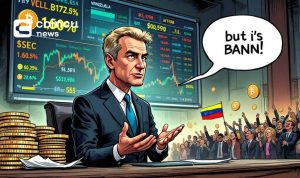The Community Criticizes The New York Times For Its Most Recent “Sympathy Piece” On FTX’s Bankman-Fried
Key Points:
- The most recent so-called “sympathy” piece from The New York Times written about FTX creator Sam Bankman-Fried has drawn criticism from the internet community, including some prominent cryptocurrency leaders.
- Bankman-Fried gave millions of dollars to regional charities, churches, and government agencies, including the police, which is why the community praised him highly.
- Alex Valaitis, the creator of the Crypto Newsletter, expressed shock that “your joke of an institution continues to try to write puff pieces on the largest swindle since Madoff.” The roughly $65 billion Ponzi scheme operated by Bernie Madoff was judged to be his responsibility.
The most recent so-called “sympathy” piece from The New York Times written about FTX creator Sam Bankman-Fried has drawn criticism from the internet community, including some prominent cryptocurrency leaders.

Local Bahamians who appeared to have generally favorable things to say about the creator of the cryptocurrency exchange are quoted by New York Times journalist Rob Copeland in the piece titled “In the Bahamas, a Lingering Sympathy for Sam Bankman-Fried” which was published on December 26.
One local said they “felt horrible for him,” and another said they thought he had a “wonderful heart.” A local interviewed for the report said it “doesn’t make any sense” that Bankman-Fried was imprisoned for his claimed offenses.
According to the story, Bankman-Fried gave millions of dollars to regional charities, churches, and government agencies, including the police, which is why the community praised him highly. Locals viewed the founder of FTX’s plans to construct a hotel and locate FTX’s headquarters there as another plus.
A self-described “crypto-degen” by the name of Cryptonator claimed that Bankman-Fried gave to the government and local charities “like Pablo Escobar.” Escobar, a legendary drug lord and narcoterrorist from Columbia, invested millions of dollars in infrastructure and charitable donations in an effort to win over the local populace.
One person interviewed for the story claimed to have a “poor viewpoint on cryptocurrency” because of the alleged theft of customer monies and fraud of billions of dollars committed by the creator of FTX.
“Why would you publish this” one Twitter user asked; “this is embarrassing,” another wrote.
“Gotta respect the NYT for doubling down,” one user tweeted about a Nov. 14 New York Times article that was also slammed by the crypto community as a “puff piece.”
The article’s description of Bankman-alleged Fried’s years-long deception as “troublesome” but “hardly comparable to the gang violence” on the island of New Providence was perhaps one of its most heinous passages.
The public defender in New York and native Bahamian Olayemi Olurin slammed the article in a video posted to Twitter.
“The lengths they will go to try to prop up this white collar criminal and they immediately start trying to criminalize a black nation [with gang violence]. The Bahamas is not some gang violence-ridden country get the fuck out of here.”
Others in the crypto community spoke up to express their criticism of the article

Alex Valaitis, the creator of the Crypto Newsletter, expressed shock that “your joke of an institution continues to try to write puff pieces on the largest swindle since Madoff.” The roughly $65 billion Ponzi scheme operated by Bernie Madoff was judged to be his responsibility.
Podcast host Scott Melker said the article was “astoundingly absurd and inappropriate” and likened The New York Times to United States tabloid newspaper the National Enquirer.
On December 12, Bankman-Fried was taken into custody on numerous allegations of wire fraud and money laundering. After his parents put up their Palo Alto home as collateral for the $250 million bond, he was extradited to the United States on December 21 and is now free on bail.
Coincu will continue to update the situation related to Sam Bankman-Fried, you can find out more information through this article.
DISCLAIMER: The Information on this website is provided as general market commentary and does not constitute investment advice. We encourage you to do your own research before investing.
Join us to keep track of news: https://linktr.ee/coincu
Website: coincu.com
Annie
Coincu News






















